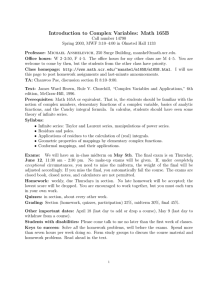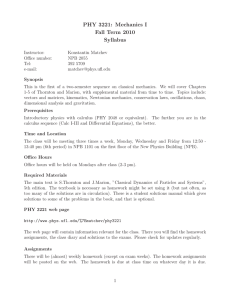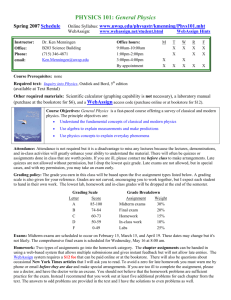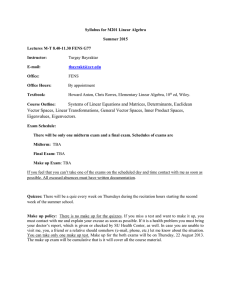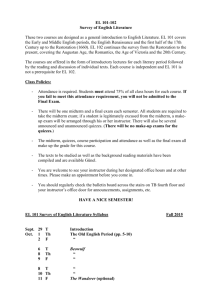General Physics II (PHY 162) Spring 2014
advertisement
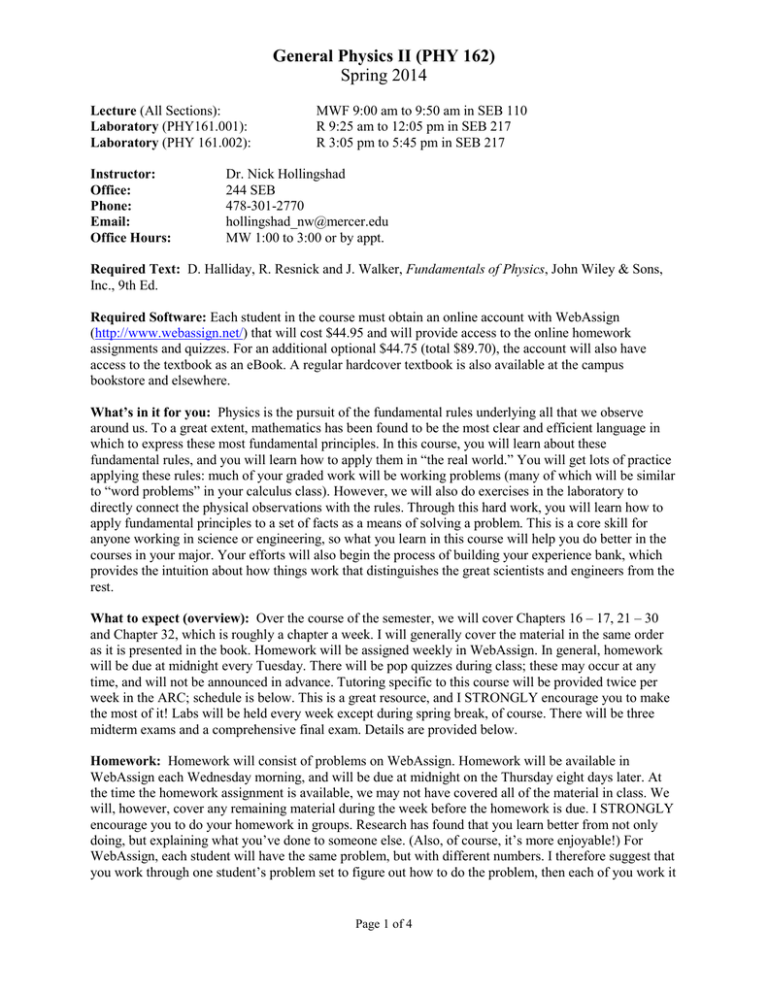
General Physics II (PHY 162) Spring 2014 Lecture (All Sections): Laboratory (PHY161.001): Laboratory (PHY 161.002): Instructor: Office: Phone: Email: Office Hours: MWF 9:00 am to 9:50 am in SEB 110 R 9:25 am to 12:05 pm in SEB 217 R 3:05 pm to 5:45 pm in SEB 217 Dr. Nick Hollingshad 244 SEB 478-301-2770 hollingshad_nw@mercer.edu MW 1:00 to 3:00 or by appt. Required Text: D. Halliday, R. Resnick and J. Walker, Fundamentals of Physics, John Wiley & Sons, Inc., 9th Ed. Required Software: Each student in the course must obtain an online account with WebAssign (http://www.webassign.net/) that will cost $44.95 and will provide access to the online homework assignments and quizzes. For an additional optional $44.75 (total $89.70), the account will also have access to the textbook as an eBook. A regular hardcover textbook is also available at the campus bookstore and elsewhere. What’s in it for you: Physics is the pursuit of the fundamental rules underlying all that we observe around us. To a great extent, mathematics has been found to be the most clear and efficient language in which to express these most fundamental principles. In this course, you will learn about these fundamental rules, and you will learn how to apply them in “the real world.” You will get lots of practice applying these rules: much of your graded work will be working problems (many of which will be similar to “word problems” in your calculus class). However, we will also do exercises in the laboratory to directly connect the physical observations with the rules. Through this hard work, you will learn how to apply fundamental principles to a set of facts as a means of solving a problem. This is a core skill for anyone working in science or engineering, so what you learn in this course will help you do better in the courses in your major. Your efforts will also begin the process of building your experience bank, which provides the intuition about how things work that distinguishes the great scientists and engineers from the rest. What to expect (overview): Over the course of the semester, we will cover Chapters 16 – 17, 21 – 30 and Chapter 32, which is roughly a chapter a week. I will generally cover the material in the same order as it is presented in the book. Homework will be assigned weekly in WebAssign. In general, homework will be due at midnight every Tuesday. There will be pop quizzes during class; these may occur at any time, and will not be announced in advance. Tutoring specific to this course will be provided twice per week in the ARC; schedule is below. This is a great resource, and I STRONGLY encourage you to make the most of it! Labs will be held every week except during spring break, of course. There will be three midterm exams and a comprehensive final exam. Details are provided below. Homework: Homework will consist of problems on WebAssign. Homework will be available in WebAssign each Wednesday morning, and will be due at midnight on the Thursday eight days later. At the time the homework assignment is available, we may not have covered all of the material in class. We will, however, cover any remaining material during the week before the homework is due. I STRONGLY encourage you to do your homework in groups. Research has found that you learn better from not only doing, but explaining what you’ve done to someone else. (Also, of course, it’s more enjoyable!) For WebAssign, each student will have the same problem, but with different numbers. I therefore suggest that you work through one student’s problem set to figure out how to do the problem, then each of you work it Page 1 of 4 General Physics II (PHY 162) Spring 2014 through with your own numbers so you can enter your own answers into WebAssign. Note that on WebAssign, you will be limited to four attempts to enter each answer. Tutoring (All Sections): We are fortunate to have Ryan DeRuiter available for tutoring on Sundays and Thursdays in the ARC from 6:00 to 9:00 pm. Ryan’s email is 10915334@live.mercer.edu. PLEASE TAKE ADVANTAGE OF THIS VALUABLE RESOURCE! Quizzes: Quizzes will be given during the lecture period from time to time, and may be given at the start, near the end, or in the middle of the lecture period. These will be pop quizzes and will not be announced in advance. You are responsible for bringing paper, something to write with and your calculator to every class. You may have nothing else on the table (or in your lap, or whatever) during the quiz. Quizzes are individual assignments, and will be turned in when directed by the instructor. Furthermore, quizzes are closed book. You may use ONLY a calculator. I will provide necessary supplemental information (such as equations) as necessary. Labs: Labs will be performed as group activities. Documentation of the lab activities will vary from week to week, depending on the activity. A single report may be submitted by each group, signed by each group member. In some cases, the group may not finish the lab report within the time allotted. In these cases, the group is responsible for completing the work outside the lab, and the report will be due at the start of the next lab session. Credit will be based 20% on data presentation (graphs, data tables, etc.) and 80% on with the introduction, answers to questions and conclusions. I may make a deduction of up to 100% of a student’s grade for the lab for late arrival, early departure or failure to participate actively with the group. No food or drink is allowed in the lab at any time. Midterm Exams: There will be three midterm exams; TENTATIVE dates and coverages are shown in the schedule below. It is important to understand that learning physics involves learning basic concepts, and applying them in progressively more advanced ways. Consequently, each midterm exam will include material, concepts, formulas, etc., extending back to the very beginning of PHY 161, although the focus will be on the material covered most recently. The problems on the midterm exams will not be the same as the homework problems, but will be readily solved by applying the concepts and problem-solving techniques that are learned in lecture and lab and described in the textbook. You may bring a calculator and pens/pencils. I will provide the exam, scratch paper, and an equation sheet. Partial credit may be available, so it is important to show your work. Final Exam: The final exam will be similar to the midterm exams, except that it will be longer and may include multiple choice questions. The final exam will be comprehensive, and will include the material covered since the last midterm exam. As with the midterms, you may bring a calculator and pens/pencils and I will provide the exam, scratch paper, and an equation sheet. Partial credit may be available, so it remains important to show your work. Missed homework, quizzes, labs and exams: You will receive a grade of zero for any missed work unless you provide sufficient justification for missing the work. I will always accept an absence officially excused by the university as “sufficient justification.” Otherwise, you must provide something in writing and I will be the sole judge of what is sufficient (for example, I have in the past accepted doctor’s notes and copies of obituaries). In the event you provide sufficient justification, the missed work will be handled as follows. In the case of homework, I will grant extensions so that you may complete the work. Labs and quizzes will not be made up, but I will ensure that the missed work does not adversely affect your grade. Exams must be made up no later than one week after your return. Page 2 of 4 General Physics II (PHY 162) Spring 2014 Assessment tests: All students are required to participate in testing for assessment purposes. At the beginning of the course students will be asked to individually complete a conceptual test on electricity and magnetism, the pre-test. This will be counted as a quiz: To receive full credit, each student must complete this test to the best of their ability, and completely and accurately enter their name, student ID and other information on the answer sheet. The pre-test score itself will not form part of any student's grade. At the end of the course students will be asked to individually complete another conceptual test, the post-test. This will also be counted as a quiz. The overall pre-test and post-test results will be used by the physics department in the assessment of our program success. For each student, the post-test result will be used to grant them a bonus on their course grade of up to +1%: a score of 50% or better will yield +0.25% bonus, 60% or better will yield +0.50% bonus, 70% or better will yield +0.75% bonus, and 80% or better will yield +1.00% (Bonuses are non-cumulative.). Grading and Grading Scale Homework Quizzes Labs Exam 1 Exam 2 Exam 3 Final Exam 10% 5% 20% 15% 15% 15% 20% 90-100% 85-89% 80-84% 75-79% 70-74% 60-69% 0-59% A B+ B C+ C D F Class Policies: Attendance: Attendance at lectures is not required but is strongly encouraged (remember – pop quizzes!). However, students are solely responsible for learning the material covered and the announcements made in the missed classes. Attendance at lab is required. Tardiness: It is your responsibility to get to class on time. If you are late, you are responsible for obtaining any information you missed. Decorum: In general, avoid doing anything to distract your fellow students or the instructor. I encourage questions during lecture, and if I don’t see your raised hand please shout out to me. Electronic devices: In order to maximize student engagement and to minimize sources of distraction, neither laptop computers nor cell phones may be used when class is in session. Likewise, no student should communicate electronically with any person inside or outside the classroom by any means while class is in session. During exams, no electronic devices of any kind may be used except for a calculator. For clarity, any device that can also be used as a phone, is capable of accessing the internet wirelessly, OR is connected to any type of removable data storage device (including but not limited to flash drives and optical drives) is NOT a calculator and may not be used during an exam. If you have any questions about this, ask me BEFORE the exam. Violation of these rules during a quiz or an exam will result in a grade of zero for that quiz/exam and potentially referral to the Mercer honor council. Any device used in violation of these rules during lecture or lab may be confiscated by the instructor for the duration of the class/lab period. Page 3 of 4 General Physics II (PHY 162) Spring 2014 Honor code: You are bound by the Mercer honor code. The College’s academic misconduct policy will be followed. All work for which a grade is received must be the original work of the student without aid or assistance of another party, or any printed and or electronic data/information. Academic misconduct cases will be referred to the honor council and the student will automatically receive a grade of incomplete (IC) pending a ruling by the honor council. Student Disabilities: Students requiring accommodations or modifications for a disability should inform the instructor at the close of the first class meeting or as soon as possible. The instructor will refer you to the ACCESS and Accommodation Office to document your disability, determine eligibility for accommodations under the ADAAA/Section 504 and to request a Faculty Accommodation Form. Disability accommodations or status will not be indicated on academic transcripts. In order to receive accommodations in a class, students with sensory, learning, psychological, physical or medical disabilities must provide their instructor with a Faculty Accommodation Form to sign. Students must return the signed form to the ACCESS Coordinator. A new form must be requested each semester. Students with a history of a disability perceived as having a disability or with a current disability who does not wish to use academic accommodations are also strongly encouraged to register with the ACCESS and Accommodation Office and request a Faculty Accommodation Form each semester. For further information, please contact Carole Burrowbridge, Director and ADA/504 Coordinator, at 3012778 or visit the ACCESS and Accommodation Office website at http://www.mercer.edu/disabilityservices. Key Dates: January 6 January 16 January 20 February 3 March 3 March 10 - 14 March 20 April 14 April 18 April 28 First Lecture (All Sections) First Lab (All Sections) MLK Holiday – Lecture CANCELLED (All Sections) MIDTERM EXAM 1 (Ch. 16 – 17, 21) MIDTERM EXAM 2 (Ch. 22 – 25) Spring Break – Lecture and Lab CANCELLED (All Sections) Last Day for Course Withdrawal MIDTERM EXAM 3 (Ch. 26 – 29) Good Friday – Lecture CANCELLED (All Sections) FINAL EXAM (Ch. 16 – 17, 22 – 30 and 34) 9:00 am to 12:00 noon Page 4 of 4


